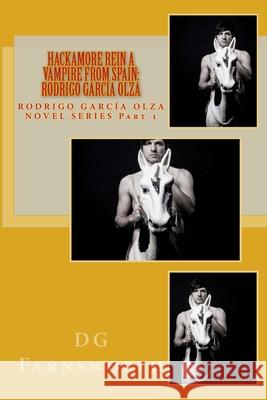HACKAMORE REIN A Vampire from Spain: Rodrigo García Olza » książka
HACKAMORE REIN A Vampire from Spain: Rodrigo García Olza
ISBN-13: 9781508627494 / Angielski / Miękka / 2015 / 246 str.
Normally when you hear hoofbeats you think about horses. Maybe sometimes you should think about zebras. Vampires may be scary, but for some people they aren't half as frightening as falling in love. This novel changes the traditional paradigm of a vampire. Triston Fallonside and Rodrigo Garcia Olza are as close as two friends can be. Their friendship developed after a clandestine benefactor offered Triston a scholarship to Spain's most exclusive equestrian riding school, right after the puzzling death of his mother. Decades earlier, Triston's father, a world-renowned Kentucky thoroughbred veterinarian, was killed in a mysterious accidental fall off a Barcelona cliff. Rodrigo's mother, a young, well-known world-class Olympic horse jumper, suffered a puzzling, agonizing death weeks after the birth of her son. Hence, Rodrigo Garcia Olza's grandfather, Spain's most famous matador, is left to raise his grandson. The media frenzy escalates around two of Spain's most famous sports figures from a single family -- both caught up in a baffling murder mystery tied to Triston Fallonside's Kentucky Bluegrass family. Not until several years after Rodrigo and Triston graduate college, Rodrigo relocates from Spain to Triston's inherited family farm in his quest as a thoroughbred trainer. Pieces of a 27-year-old murder mystery (and its connection to Triston's father's tragic death) begin to unfold. Two ghosts, both residing within Fallonside House, provide clues that solve decades of secrets: a conundrum that shakes both Rodrigo and Triston to the core of their being. But foremost, for Rodrigo Garcia Olza and Triston Fallonside it is all about horses, bourbon, Depeche Mode, and enjoying life to the fullest... A vampire will intentionally pretend to be anything you want to believe it is for the single motive of draining life force energy. In the media the vampire is used to communicate the message of a feeling of mortal alienation from God, and a wish to conquer that alienation. Often the vampire in literature pushes the reader and main character on a spiritual journey with both religious and psychological elements to aid in their comprehension of the value of their existence. A vampire may convey isolation but has a strong religious or spiritual quality representing the transcendental agent through which individuals and societies may confront questions about their innate goodness or evilness -- a belief in God, and the possibility of the afterlife. Instinctual entities exist only to siphon our life force by fabricating paranormal diversions to create our experiences: to mimic whatever is needed to feed off our energy to assist their own. Beings pretend to be ghosts, demons, angels or anything our imagination gathers to invoke an emotional response.
Zawartość książki może nie spełniać oczekiwań – reklamacje nie obejmują treści, która mogła nie być redakcyjnie ani merytorycznie opracowana.











